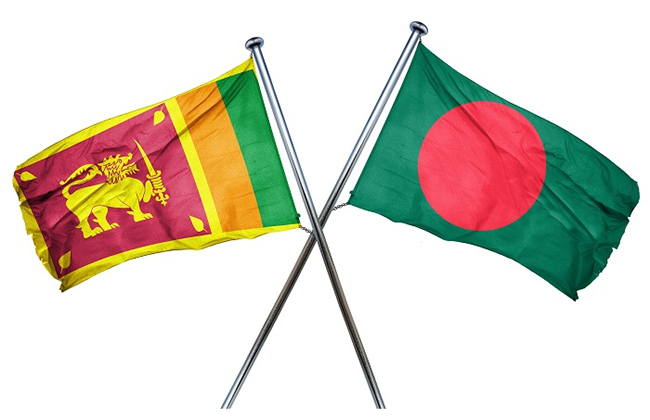
Many Bangladeshi products have bright potential in the Sri Lankan market. Similarly, there are huge possibilities for Lankan products in Bangladesh. Now it is high time to address the need to increase the participation of the private sector in the two countries. Sri Lankan entrepreneurs should invest in Bangladesh to serve their own business interests.
Sri Lanka has invested in Bangladesh’s power sector. Some more opportunities are there for Sri Lankan investors in Bangladesh’s special economic zones, industrial parks and high-tech parks.
The two countries can exchange their experiences in agriculture including paddy cultivation, and freshwater fish farming, tourism, cricket diplomacy as also Covid-19 vaccine diplomacy. Bangladesh has an interest in acquiring technical knowledge from Sri Lanka on coastal, aquaculture, marine culture and deep-sea fishing. More institutional cooperation in the field of education for technical training and skill development can strengthen the ties.
Bangladeshi nurses and other health workers can be trained in Sri Lanka, which can benefit from importing world-class medicines from Bangladesh.
Bangladesh has been doing well in the electronics field, and its products are available in Nepal now. Sri Lanka can import electronics products from Bangladesh to fulfill the demands of its people.
Even Rajapaksa has praised the digital transformation of Bangladesh under the leadership of PM Sheikh Hasina and emphasized increasing trade and expanding the scope of business between the two countries. He lauded Hasina’s leadership in tackling the pandemic. He evinced interest in exchanging experiences on blue economy and disaster management.
Extending port facilities: Sri Lanka has already allowed Bangladesh to use the seaport of Hambantota in its Southern Province. This throws open a huge opportunity for Bangladesh. Bangladesh-Sri Lanka trade volume in money terms is USD 61 million. The government is thinking of increasing it further.
Apart from this, Dhaka is also thinking of providing various facilities to bring investment to Sri Lanka. Chittagong port has historic connectivity with Colombo port. By using Hambantota port, Bangladesh can reach Central Asia, West Asia, Eurasia, Russia, China through the utilization of Pakistan’s Gwadar port and Iran’s Chabahar port.
Sri Lankan Prime Minister Mahinda Rajapaksa visited Bangladesh to mark the birth centenary of Its founder Bangabandhu Sheikh Mujibur Rahman and also the golden jubilee of Bangladesh’s independence and had detailed talks with Prime Minister Sheikh Hasina. The meeting agreed to take trade relations between the two countries to new heights. The meeting also signed six memoranda of understanding on bilateral cooperation.
Various regional and international issues were discussed during the one-hour summit. During the meeting, Sheikh Hasina stressed the need for a free trade agreement between the two countries, saying the amount of trade is less than expected. For this, both sides should quickly go for a free trade agreement.
According to the Bangladesh Bank, the country’s trade volume with Sri Lanka is very low. In the 2019-20 financial year, only goods worth Bangladesh Tk 473 crore were imported from Sri Lanka to Bangladesh. In the same financial year, only Bangladesh Tk 325 crore worth of goods were exported from Bangladesh.
Bangladesh signed its maiden preferential trade agreement with Bhutan in December 2020, with the people of the two nations reaping the dividends. If a free trade agreement is signed, then only the sky would be the limit for Bangladesh-Sri Lanka business relations.
Maritime security: The Colombo Security Conclave held earlier this month has ushered in opportunities for both Bangladesh and Sri Lanka concerning maritime security.
Sri Lanka has recently been suffering from a foreign exchange reserve crisis. As per the latest reports, it has only USD 500 million in foreign exchange reserves. With this reserve, Colombo can’t meet its import expenses for three months. To keep the reserves risk-free, at least three months of import expenditure has to be kept aside.
Bangladesh has decided to lend USD 250 million to the Central Bank of Sri Lanka from its foreign exchange reserves. To this end, Bangladesh Bank is going to sign a memorandum of understanding with the Central Bank of Sri Lanka. According to Sri Lankan media outlets, Bangladesh has already disbursed USD 50 million to Sri Lankan authorities. This will pave the way for new multi-dimensional economic relations.
The Bangladesh government has taken the initiative to export 21 products to Sri Lanka with duty-free facilities. At the same time, the two countries have started expanding bilateral trade, increasing investment, and developing their shipping and tourism industries. Readymade garments, medicines, jute and jute products, ceramics, juices, food products, vegetables, peppers, construction materials, melamine, paper and paper boards, flowers, plastic products, leather and leather products, shoes, soybean oil, potatoes, fertilizers and cosmetics from Bangladesh have a huge demand in the Sri Lankan market.
The Bangladesh government’s efforts to get a duty-free market facility for the export of these products show Sri Lanka is becoming increasingly important in increasing regional trade. As a result of various initiatives, Bangladesh’s trade relations with Sri Lanka will get further strengthened. The friendly relations between the two nations are also playing an important role in increasing trade and investment.
PM Sheikh Hasina is very keen to strengthen ties with all South Asian countries. She has been laying stress on economic diplomacy and ordered all government officials to ensure maritime trade and blue economy are given precedence in the government’s agenda. There is huge potential in tapping marine resources in the Bay of Bengal region; Sri Lanka can assist Bangladesh in this area.
Bangladesh has taken the initiative, whose significance is huge, not just for the two countries but for South Asia. Both states should now build upon their growing business relations for mutual benefit.
Md Pathik Hasan is a Dhaka-based NGO activist and freelance writer

